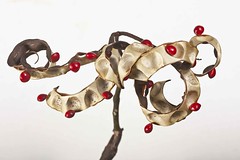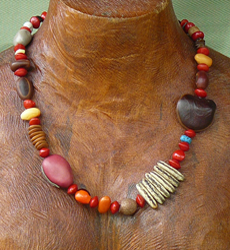 |
| jewellery by Spinefex designs |
 |
Adenanthera pavonina seed |
 |
Adenanthera pavonina seed pods |
 |
Adenanthera pavonina seed pods |
 |
RECLAIMED AUSTRALIAN TIMBERS AND DESERT BATWING CORAL SEED |
 |
COLOURS OF THE EARTH |
 |
Red Sandelwood seedpod - spinifex designs image. |
ADENANTHERA PAVONINA - RED SANDALWOOD.
Overview
Red Sandalwood a big beautiful, medium to large-sized tree ranges from 18 - 45 feet in height, with pinnately compound leaves and dense racemes of fragrant, light-yellow blossoms.
The curved pods contain the seeds, which are exposed when these pods curl back.
These seeds are very similar in shape and size; they have a uniform weight of about four grains. It takes about 4 seeds to make one gram and approximately 109 to make an ounce.
The seeds are used in necklaces and ornaments.
Although the raw seeds are toxic, when cooked they are edible.
The seeds are roasted, shelled and then eaten with rice inJava , Indonesia
The slender flattened pods become twisted as they split open at maturity to release up to 12 brilliant red, lens - shaped, extremely hard seeds.
The ripened pods stay on the tree for some time.
The hard reddish wood of the red sandalwood tree is used for cabinet making. With exposure to light, the wood it slowly turns purplish-red.
A red dye, obtained from the wood, is used by Brahmins to mark religious symbols on their foreheads.
Extracts from the seeds demonstrated anti-inflammatory and analgesic effects.
Red Sandalwood a big beautiful, medium to large-sized tree ranges from 18 - 45 feet in height, with pinnately compound leaves and dense racemes of fragrant, light-yellow blossoms.
The curved pods contain the seeds, which are exposed when these pods curl back.
These seeds are very similar in shape and size; they have a uniform weight of about four grains. It takes about 4 seeds to make one gram and approximately 109 to make an ounce.
The seeds are used in necklaces and ornaments.
Although the raw seeds are toxic, when cooked they are edible.
The seeds are roasted, shelled and then eaten with rice in
The slender flattened pods become twisted as they split open at maturity to release up to 12 brilliant red, lens - shaped, extremely hard seeds.
The ripened pods stay on the tree for some time.
The hard reddish wood of the red sandalwood tree is used for cabinet making. With exposure to light, the wood it slowly turns purplish-red.
A red dye, obtained from the wood, is used by Brahmins to mark religious symbols on their foreheads.
Extracts from the seeds demonstrated anti-inflammatory and analgesic effects.
A red powder made from the wood is also used as an antiseptic paste. In Ancient Indian medicine, the ground seeds are used to treat boils and inflammations. A decoction of the leaves is used to treat gout and rheumatism. The bark was used to wash hair. able to fix nitrogen and thus help rejuvenate soils.
I will have to come back with the note on where this text was found on google.
 |
 |

8 comments:
These are simply and utterly gorgeous. Yes, they deserve to be made into jewellery. They look so beautiful.
Stunning! I love how organic the jewelry looks and must feel that way too.
I have a bracelet with red seeds like these. I've often wondered where they were from... Lovely images, as always!
very delighted to see you have found your way here and like these everyone ... and thanks for visiting and leaving a comment!
Hello Priya,
yes... they are gorgeous...i wonder if they have this or a similar seed in your part of the world?
It just feels and looks so good this organic jewellery doesn't it Rosaria?
I know that pleasant surprise Alice... identifying something you have to its source in nature... i like the Spinifex website fro the way they really honour the origins of their materials!
cheerio,
Sophie
I remember these seeds from my childhood...living in Lae, Papua New Guinea...we had these trees growing as street trees...and we children would collect and play with them...they have a very hard covering and I think we used them to decorate mud pies mainly...we must have been warned not to eat them...
Dear E,
great to hear about this ....I imagine they were this species as they are only found in the northern most areas of this continent ... therefore most likely where you were.
They would have made fabulous features on top of your mud pies!
I bet there are other species perfect for this purpose too up there!
Thanks for popping in!
S
We have these seeds in the tiny island of Grenada in the Caribbean, where I live. I love to make jewellery from them and by researching them on the net I know there are red seed lovers worldwide! Take a look at what I do please visit mamabois.etsy.com
thanks
Hello M,
would love to see what you are doing....
back soon...
S
Post a Comment